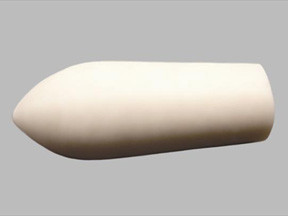MESALAMINE (5-AMINOSALICYLIC ACID) SUPPOSITORY - RECTAL
PHONETIC PRONUNCIATION: (mess-AL-uh-meen)
COMMON BRAND NAME(S): Canasa, Rowasa
GENERIC NAME(S): mesalamine
Uses
USES: Mesalamine (also known as 5-aminosalicylic acid) is used to treat ulcerative proctitis, a type of bowel disease. It does not cure ulcerative proctitis, but it may decrease the number of stools, the amount of mucus/blood in the stools, and the rectal bleeding caused by irritation/swelling of the colon/rectum. Mesalamine is an aminosalicylate anti-inflammatory drug. It is believed to work by blocking the production of certain natural chemicals that may cause pain and swelling.
How to use MESALAMINE (5-AMINOSALICYLIC ACID) SUPPOSITORY - RECTAL
HOW TO USE: Read the Patient Information Leaflet provided by your pharmacist before you start using mesalamine and each time you get a refill. If you have any questions, consult your doctor or pharmacist. Use this medication rectally. If you are using the 1000-milligram strength, insert rectally, usually once daily at bedtime. If you are using a lower strength, then your doctor may direct you to use this medication 1 to 3 times daily. Follow your doctor's directions carefully. Dosage is based on your medical condition, response to therapy, and the strength of your prescription. This medication works best if you have a bowel movement before using it. Wash your hands before and after using the medication. Unwrap the suppository right before using. Try to handle it as little as possible because heat from your fingers may cause it to melt. Lie down on your left side with right knee bent. Gently insert the suppository, pointed end first, into the rectum with your finger. Use a small amount of lubricating gel on the tip of the suppository if desired. Remain lying down for a few minutes. Try to avoid having a bowel movement for 1 to 3 hours, keeping the suppository in place so the medicine can work. This medication may stain surfaces that it touches (such as clothing, floor, and counter surfaces). Use this medication regularly in order to get the most benefit from it. To help you remember, use it at the same time(s) each day. Tell your doctor if your condition persists or worsens.
Side Effects
Precautions
Interactions
Overdose
Images
Reviews
Disclaimer
IMPORTANT: HOW TO USE THIS INFORMATION: This is a summary and does NOT have all possible information about this product. This information does not assure that this product is safe, effective, or appropriate for you. This information is not individual medical advice and does not substitute for the advice of your health care professional. Always ask your health care professional for complete information about this product and your specific health needs.

No Reviews Yet